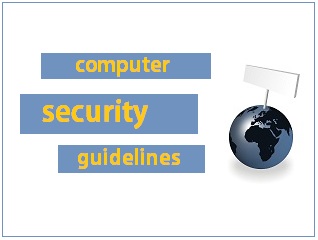Knowing the best computer security practices and following them in your daily activities accounts for 90% of your computer security. Once you learn and stick to these practices, you can easily thwart most of the common computer attacks.

While computer security software and hardware is essential, it cannot deliver 100% security if the computer user is not aware of the most widespread threats and the necessary steps that they need to take in order to neutralize them. Listed in this article are some good security practice guidelines, which can prevent identity theft, loss of documents and files, and work interruption.
The best practices for computer security
Use antivirus software There are many excellent antivirus programs and you can have one installed and running on your computer in a matter of minutes. Once the antivirus program is up and running, make sure that it is set to automatically update its virus definition, so it can intercept and eliminate new threats swiftly.
Use antimalware program Even the best Antivirus programs will not find all threats and you should download and install additional security software that can discover and eliminate zero-day malware.
Use hardware firewall whenever possible. The hardware firewall adds additional level of security and can easily protect your network and computer from many of the potential computer security threats.
Use software firewall All Windows computers since Window XP have their firewall turned on by default – make sure that the firewall stays on and add exceptions only for trusted software programs. If you need to open a port, make sure that you know the risks involved.
Keep the operating system up to date Turning on automatic OS updates will ensure that any potential vulnerabilities are patched up quickly and your computer is not at risk.
Keep your software up to date You should keep your software programs updated since hackers constantly search for weaknesses within the code of popular software programs and use these weaknesses to launch their attacks. You should also periodically uninstall programs that you no longer use.
Download and install software only from trusted websites If you download and use cracked programs, you would greatly increase the risk of computer infection – make sure that you download only trusted software from well-known websites.
Choose strong passwords, which cannot be easily guessed. When choosing a password, do not use your or your family members’ names, birthdates, addresses, pet names, or anything that is easy to guess. Whenever possible, ensure that the password is at least eight symbols long and contains letters (both lower and upper case), numbers, and special characters. Do not reuse passwords – while using the same password for all your email accounts, social sites accounts, or online banking might be easier, it poses greater security risk.
Be careful with email attachments You should not open any email attachments or attachments, sent over Instant Messenger, unless they are from someone you know.
Beware of phishing and other scams Do not share personal or financial information’s as well as usernames and passwords with anyone, even if they pose as government agents or bank officials. Do not share the same information in chat rooms or post more than the necessary minimum on your social websites’ profiles.
Secure your desktop computers and laptops Ensure that your laptop is with you at all times or locked in a safe place. Protect both your laptop and desktop computer with passwords, create several user accounts if you are not the only one using them, and turn them off when they are not in use.
Conclusion
I have listed some of the rules that we should all follow in order to keep our computers safe. While there are certainly many more, in most cases it all comes down to knowing the potential risks and applying common sense!
